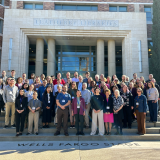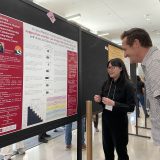Biology Education Research Group Presents Research at 8th-Annual SABER West Conference Topics ranged from active learning and study habits to racial identity in STEM
January 22, 2024
This past weekend, Assistant Professor of Biology Jeremy Hsu and his lab participated in the Society for the Advancement of Biology Education Research (SABER) eighth-annual west-coast conference at the University of California, Irvine. SABER members pursue research that explores theory and methods for improving post-secondary biology education.
Hsu’s team, the Chapman Biology Education Research group (CBER), seeks to improve biology education by examining student and instructor experiences both inside and outside the classroom. The group, composed of five undergraduates, two graduate students, and GCI postdoctoral fellow Desiree Forsythe, gave three oral presentations and presented four posters. Assistant Professor of Biology Jean-Louis Bru also attended.
“Being able to present, share their work, and obtain feedback at this conference is an invaluable experience for the students,” said Hsu. “It’s also really great for the students to get a glimpse of the breadth of the field, when they see the really exciting research projects from across the country!”
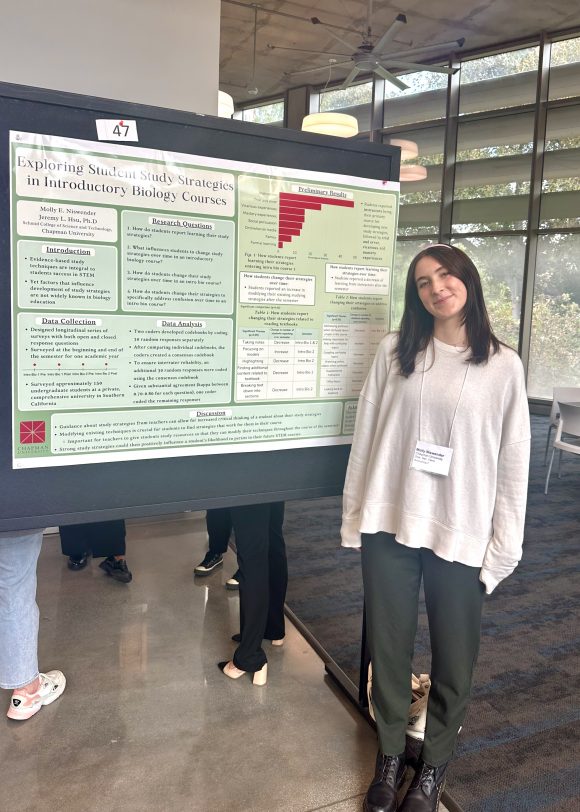
Molly Niswnder ’26 presented her poster “Motivation and application of study strategies in introductory biology courses” on Sunday, January 14.
Molly Niswender ’26, a biochemistry major and documentary minor, intends to pursue a PhD in biology after graduation (and plans to use her filmmaking skills to communicate about cancer research with the public). “This conference was extremely influential in connecting me to those who are passionate about furthering biology education and equity in STEM, and I am extremely grateful for that,” she said.
Niswender’s research focuses on study strategies in introductory biology courses. “The most interesting theme that emerged, in my opinion, was the role that social media and video-related content had in students’ development of new study strategies,” she said. “It remained a consistent theme throughout all of the biology courses that were surveyed.” As she continues work on this project, Niswender plans to investigate what kinds of study strategies tend to be promoted on social media.
Gabby Dauber ’24 presented research about student experiences in STEM course office hours. After graduation, Dauber will be pursuing a PhD in biology and hopes to become a professor. “My experience in Dr. Hsu’s biology education group has greatly supported my future goals in aspiring to continue this type of research — while hopefully equipping me to become a great teacher for students. I plan to implement my research findings to improve the education system and support students as a future instructor.”
Briana Craig ’24, MS ’25, presented research about the impact of the COVID-19 pandemic on students’ perceptions of ‘active learning.’ She found that students reported less familiarity with the concept of ‘active learning’ during fully remote semesters (as opposed to semesters taught on campus). “When in-person learning resumed, students were more familiar with the concept but not at the same level as pre-pandemic,” she said.
“We saw the same trend in students’ preference to learn by lecture. Students did not prefer lecture before the pandemic, but once they switched to remote teaching, a majority of students reported that they did prefer lecture.”
Craig also measured students’ self-perceptions as members of the science community. “Despite being less familiar with the concept of ‘active learning’ during online learning, there was no corresponding dip in students’ sense of belonging,” she said. “This is good news because one’s sense of belonging should not be dependent on how much you know or how much experience you have. Science is for everyone!”
“One’s sense of belonging should not be dependent on how much you know or how much experience you have.”
In Schmid College, over half of undergraduate students conduct research with professors. With a 4:1 student-faculty ratio, working with faculty on research is a simple process for students. “I love mentoring undergrads in the lab,” said Hsu. “Students in Schmid often reach out to me if they’re interested in education work.”
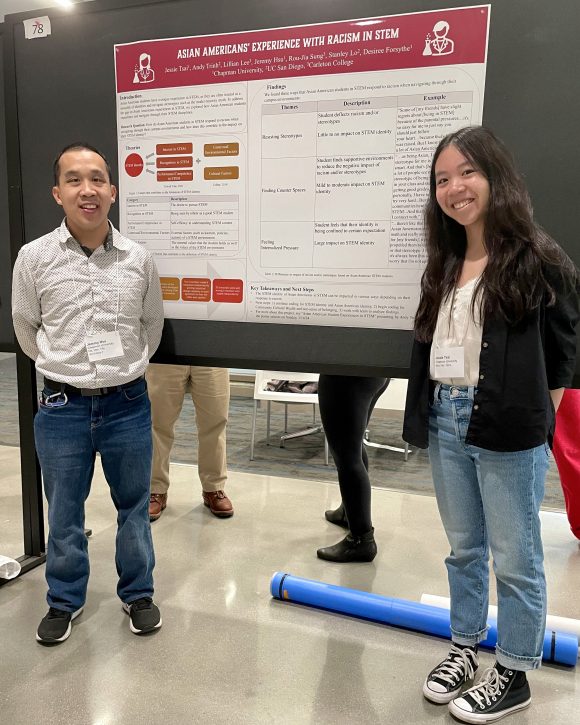
Jessie Tsai, PharmD ’26, presented her poster “Asian Americans’ experience with racism in STEM” on Saturday, January 13.
“I was a former student of Dr. Hsu, and he was one of my favorite professors,” said Jessie Tsai, PharmD ’26. Last summer, before beginning the pharmacy portion of her degree (through the APEx 2+3 Program), Tsai emailed Hsu to inquire about a job opening in his research group.
“I’ve always had an interest in education. I am planning to both teach and practice as a future pharmacist,” said Tsai.
Tsai’s research aims to better understand the experiences of Asian Americans in STEM. “This area is currently understudied,” said Tsai. “Although the project is still in a very early stage, our team has started to see themes emerge. Some Asian American students experiencing racism may not feel an impact at all on their STEM identity, some may find ways to navigate out of its negative impacts, and some may feel a sense of internalized pressure by the existence of unrealistic standards based on the model minority myth.”
The conference’s theme, “Building Bridges for Equity in STEM,” was present throughout the weekend.
“In the past, STEM was dominated by mostly white men,” said Tsai. “Now, the STEM field has grown to include people with a variety of identities, but inequities may still be present. As an Asian American woman, equity in STEM is significant to me since I would not be able to follow my dreams today without the continuous fight for it.”
“SABER had an array of research and perspectives that I was unfamiliar with, which was eye-opening,” said Sean McCallum ’26. “Most of the presentations I listened to centered around diverse perspectives in STEM, in particular how to better accommodate underserved student populations.”
McCallum noted that she intends to use the knowledge she gained at the conference to be a better advocate for her peers on campus.
“SABER had an array of research and perspectives that I was unfamiliar with, which was eye-opening.”
McCallum’s poster was titled “Speak Up! An interactive workshop aimed at fostering ally development to reduce microaggressions among college students.” The long-term goal of her research is a reduction in bias and the production of more positive STEM environments.
“Doing research is such a fantastic opportunity for undergraduate students,” Hsu said. “They’re able to think critically and make decisions about the study design, perform the work (including building surveys, conducting interviews, and doing observations), analyze the data, and draw conclusions about how students learn.”
“I’ve found that research experiences can be transformative for students,” continued Hsu. “Not only are they growing as scientists, but they’re often able to apply the findings from their work in their own learning.”
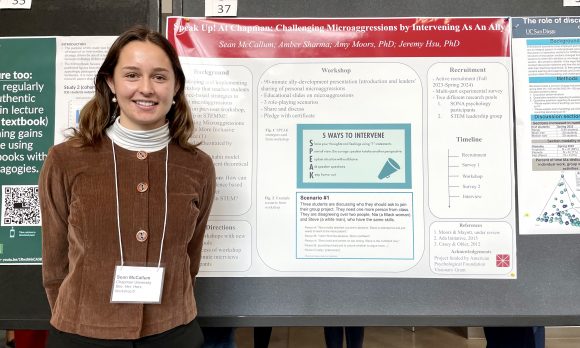
Sean McCallum ’26 presented her poster “Speak Up!: An interactive workshop aimed at fostering ally development to reduce microaggressions among college students” on Sunday, January 14.

